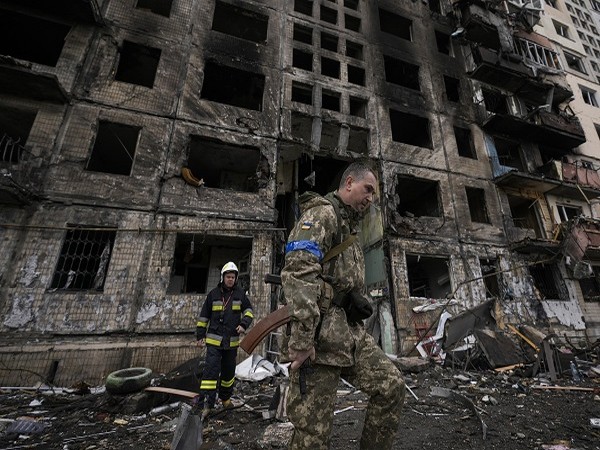WRAPUP 3-U.S. urges citizens to leave Ukraine as fears grow of Russian attacks on capital
On the battlefield, Russian forces carried out artillery and air strikes in the Zaporizhzhia region in southeastern Ukraine, where fighting has taken place near Europe's largest nuclear power plant, the Ukrainian military said. But six months on from Russia's Feb. 24 invasion of Ukraine, and with thousands of deaths and widespread destruction of cities, the conflict is locked in a stalemate.

- Country:
- United States
The United States on Tuesday urged its citizens to leave Ukraine, saying it believed Russia was preparing to target civilian and government infrastructure in the next few days as the war reaches the six-month mark. The warning followed a ban by the Ukrainian government on celebrations in the capital Kyiv on Wednesday's anniversary of independence from Soviet rule due to fears of attack.
Leaders of dozens of countries and international organizations were due to take part on Tuesday in the so-called Crimea Platform in solidarity with Ukraine on the Russian invasion's six-month anniversary. Most would do so by video. On the battlefield, Russian forces carried out artillery and air strikes in the Zaporizhzhia region in southeastern Ukraine, where fighting has taken place near Europe's largest nuclear power plant, the Ukrainian military said.
But six months on from Russia's Feb. 24 invasion of Ukraine, and with thousands of deaths and widespread destruction of cities, the conflict is locked in a stalemate. Russian forces control a large swathe of the south, including along the Black Sea coast, and chunks of the eastern Donbas region. The prospects for peace look almost non-existent.
Fearing a surge in Russian attacks, the U.S. Embassy in Kyiv on Tuesday urged U.S. citizens to leave if they could. "The Department of State has information that Russia is stepping up efforts to launch strikes against Ukraine’s civilian infrastructure and government facilities in the coming days," the embassy said in a statement.
U.S. citizens should leave Ukraine "now" by their own means if it was safe to do so, it said. Although it was not the first time the United States has issued such a warning, this one was made as Ukraine was due on Wednesday to mark 31 years of independence from Soviet rule.
It also followed the killing of Darya Dugina, the daughter of a prominent Russian ultra-nationalist, in a car bomb attack near Moscow on Saturday. Moscow has blamed the killing on Ukrainian agents, an accusation Kyiv denies. Ukrainian President Volodymyr Zelenskiy has also said Moscow could try "something particularly ugly" in the run-up to Wednesday's anniversary.
Kyiv is far from the frontlines and has only rarely been hit by Russian missiles since Ukraine repelled a ground offensive to seize the capital in March. The mood in the city remained calm on Tuesday, with many people still wandering the streets with smiling faces, but signs of the increased threat could be felt.
Authorities have told Ukrainians nationwide to work from home where possible from Tuesday to Thursday, also urging people to take air raid warnings seriously and seek shelter when sirens sound. The Kyiv city administration banned large public gatherings until Thursday, fearing that a crowd of celebrating residents could become a target for a Russian missile strike.
Polish President Andrzej Duda, one of Ukraine's strongest supporters, was in the capital on Tuesday to discuss further support for Ukraine with Zelenskiy, including military aid. NUCLEAR POWDER KEG
Russian shelling hit the eastern city of Kharkiv - Ukraine's second-largest city - around dawn on Tuesday, regional governor Oleh Synehubov said. A house had been hit but no one was hurt, he said. In the south, Ukraine said Russia fired artillery and mounted air strikes in several towns in the Zaporizhzhia region, where Russian forces captured the nuclear power plant shortly after the start of the invasion.
Artillery and rocket fire near the Zaporizhzhia nuclear reactor complex, on the south bank of the Dnipro River, has led to calls for the area to be demilitarised. The two sides have traded blame over frequent shelling at the plant. Kyiv accuses Moscow of basing troops and storing military hardware there. Russia denies this and accuses Ukraine of attacking Zaporizhzhia with drones.
Moscow requested a U.N. Security Council meeting be held on Tuesday to discuss the Zaporizhzhia plant, Russian state-owned news agency RIA reported, citing Deputy Ambassador to the United Nations Dmitry Polyanskiy. In other action, Ukrainian forces shelled a building housing the local administration headquarters in the centre of separatist-controlled Donetsk city on Tuesday, TASS news agency reported, quoting Russian-installed officials. Three people were killed, it said.
Russia's defence ministry said its forces had downed a Ukrainian SU-27 warplane over the Kharkiv region. Russia sent its troops over the border in what it calls a "special military operation" saying it wanted to demilitarise its neighbour and protect Russian-speaking communities. Ukraine and its Western allies accuse Moscow of waging an unjustified war of aggression.
The U.N. High Commissioner for Human Rights said on Monday that 5,587 civilians had been killed and 7,890 wounded between Feb. 24 and Aug. 21, mainly from artillery, rocket and missile attacks. The U.N. children's agency UNICEF said at least 972 children have been killed or injured over six months of war. Separately, Ukrainian armed forces chief General Valeriy Zaluzhnyi provided what appeared to be the first public Ukrainian military death toll, saying nearly 9,000 soldiers had died in action.
Russia has not said how many of its soldiers have been killed. Ukraine's General Staff have estimated the Russian military death toll at 45,400. Reuters has been unable to verify military losses.
(This story has not been edited by Devdiscourse staff and is auto-generated from a syndicated feed.)
ALSO READ
Diplomatic Push: US and Allies Seek Peace in Russia-Ukraine Conflict
Florida Peace Talks Surge Amidst Ukraine-Russia Tensions
Tensions Escalate: Russian Forces Enter Ukrainian Village
Sanctioned Russian Vessel 'Adler' Inspected by Swedish Authorities
U.S.-Russia Peace Talks Stalled Amid European, Ukrainian Concerns










